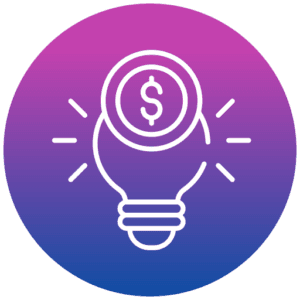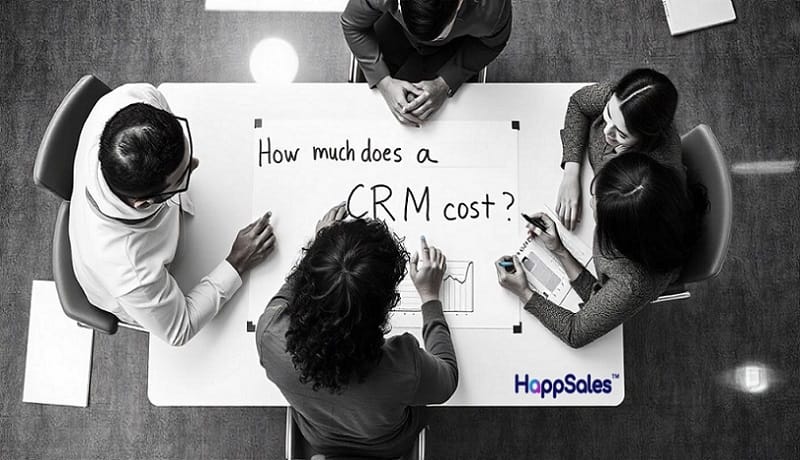Last updated on January 8th, 2025 at 02:56 pm
Introduction
CRM software pricing often involves varied price models, different tiers, hidden fees, and add-ons. This makes the process of navigating and understanding CRM software cost quite overwhelming.
The objective of this article is to explain and offer insights into various factors like features, scalability, implementation, etc. that determine CRM software pricing. This serves as a guide to help you make a well-informed decision while selecting the right customer relationship management CRM at the right cost that best suits your business needs.
To begin with, let us understand the key factors that largely influence CRM Price.
Key Factors Influencing CRM Software Pricing
Number of Users
The number of users accessing a CRM system will influence CRM pricing the most. Most CRM providers follow a software subscription model based on per-user, per-month pricing.
Some CRM providers offer tiered pricing based on user slabs, while a few others charge a flat-fee. You will also be able to avail certain discounts as you increase your consumption or if you decide to go for an annual subscription paid upfront.
Software Features
In the case of tiered-pricing models, the pricing slab is determined by the set of software features and capabilities that you would like to activate in the CRM software.
Some CRM providers offer just the basic features at a lower fee to reduce the barriers for clients to sign-up. They gradually increase the fee when the client wishes to use more features.
To avoid any future surprises and bring in more predictability, many clients prefer to choose a CRM software vendor that offers a flat-fee for all the features. This will help you avoid any hidden fees.
Deployment – Cloud vs On-Premise
A CRM software can be deployed either on-premise or on cloud.
On-premise CRMs will require you to make an upfront capital investment to obtain the software license. Which is why this expense gets categorized as capital expense (capex). Whereas, cloud-based CRMs involve a software subscription fee that you pay to the vendor at regular intervals like month, year, etc. This expense gets categorized as operational expense (opex).
On-premise CRMs will require you to budget for high upfront costs towards software usage, implementation and maintenance, upgrades and updates, datacenter and hardware costs, etc. On the other hand, Cloud CRMs eliminate the need for dedicated infrastructure or maintenance as they are deployed on the Cloud and not within the premises.
Professional Fees: Set-Up, Implementation, Training
Professional fees comprise of charges towards setup costs, implementation, training, integrations, etc. This varies depending on multiple factors like the CRM software vendor, the implementation partner, the scope of the project, effort and time required to configure the system as per business requirements, etc.
There are some CRM softwares that can take several months and quarters to go-live. While there are a few that can be implemented within a few days and weeks.
Most CRM vendors will require you to engage expensive third-party consultants for process guidance and implementation. While a few CRM software vendors offer embedded industry best-practices built into the software, eliminating the need for costly external consultants.
Scalability
Scalability is also an important factor that influences CRM software pricing. You may want to start with a basic package and then expand as you scale up.
Scaling up can be in terms of more users, larger database size, need for more advanced features, etc.
Many CRMs offer tiered pricing that will need you to move up the tier as you scale up. A few CRMs offer all functionalities at one flat-fee.
Customer Support
There are a few CRM vendors who offer different levels of support at different prices. Not all CRMs offer customer support via email, phone, and WhatsApp. Most CRMs only offer email support in their basic package You will need to upgrade to higher plans if you want telephonic support or better SLAs. It is a good idea to understand the implications upfront to avoid any surprises later.
Total Cost of Ownership (TCO)
It is crucial to understand the Total Cost of Ownership (TCO) rather than just the standalone CRM price.
TCO considers all direct and indirect software costs associated with the CRM. It provides the most comprehensive view of the financials involved.
The pricing components should include – CRM software license to be invested upfront and recurring, implementation and training costs, any infrastructure requirements, costs towards maintenance and future upgrades, operational overheads, etc.
How to Choose an Affordable CRM Software Wisely
Define your Business Challenges
Before diving into the evaluation of different CRM solutions, it’s crucial to have a clear understanding of your business’s current requirements and pain points. Start by identifying the specific challenges you’re facing—whether it’s inefficient lead management, poor customer engagement, or lack of visibility into your sales pipeline. Then, consider how a CRM can address these issues and align with your broader business goals.
Identify the number of users
It is essential to identify the number of users who will use the CRM. All users, including in future, must be taken into consideration. You might be able to get a better volume discount for a larger number of users. At the same time, the CRM that you are evaluating should have the capacity to scale up easily when you wish to add more users and also be cost-effective.
Ascertain the required Features
It’s important to identify the features required to solve your pain points. For instance, SMBs will require only a small set of features while larger organizations might look for advanced functionalities. Prioritize the one that is most important to achieve your business goals. Ensure that you have access to these features and avoid overpaying for the features that you may not need.
Deployment type – Cloud CRM vs On Premise CRM
One of the most important factors to consider while choosing the right CRM is to decide the type of deployment – Cloud CRM or an On-Premise CRM.
In the last few years, more and more companies have realized the benefits of moving to Cloud CRM as against On-Premise CRM.
This detailed article comparing Cloud CRM and On-Premise CRM will help you understand the key differences between them and help you make your choice depending on your specific needs.
Integration requirements
Are there any tools that you wish to integrate with your CRM? Before proceeding, determine the tools that need to be integrated. Ensure that the CRM vendor provides a cost-effective solution for these integrations.
Need for third-party consultants
Find out if you will need to engage external third-party consultants for implementation, training, integrations, etc. Their costs can make a huge difference to the overall TCO.
Assess Data Storage Costs
People often overlook the aspect of CRM pricing in the cost of data storage. All the important databases from account information to sales history are in your CRM. With few cloud-based CRMs, storage comes with a predefined limit based on the subscription plan. Once you exceed this limit, you might incur additional costs. It’s crucial to evaluate this early on.
 Bonus Tips: Considering alternatives to Salesforce?
Bonus Tips: Considering alternatives to Salesforce?
Discover a cost-effective, yet powerful CRM tailored to your needs in our guide to the best Salesforce alternatives.
Why HappSales is the most affordable CRM
Comprehensive Features at Most Affordable Price
HappSales software offers an all-in-one integrated solution to transform Key Account Management, Lead Management, Sales, Service, Receivables & workflow. Its integrated framework with such extensive features make it the most affordable and cost-effective solution when compared to other CRMs that offer these features as separate add-ons, each with additional costs.
Predictable Flat-Fee Pricing
HappSales software has no complicated tiers, no hidden fees, and no usage limits. We use a flat-free model that is very transparent to clients. This structure enables you to plan your CRM budgets with certainty while accessing all necessary features.
Lowest Total Cost of Ownership (TCO)
HappSales software stands out for its low TCO. It is known for its quick onboarding supported by inhouse team without the need for expensive third-party consultants. There are no hidden fees and surprises when you work with HappSales. This makes the TCO 40% lower when compared to other enterprise-grade CRMs.
Includes Cutting-Edge AI capabilities
HappSales software integrates cutting-edge AI technologies like RAG AI, Conversational AI, NLP, and Machine Learning. It ensures your business is equipped for current and future business needs.
Cost-Effective Web & Mobile Access
Both mobile and web access are included in the pricing. There is no extra cost for mobile access. Having mobile access ensures that all field representatives can update details on the go. They don’t have to carry their laptops wherever they go. This increases their productivity and operational efficiency.
Embedded Best Practices
HappSales software has embedded industry best practices directly into the software. This eliminates the need for costly third-party business consultants if you want to learn and adopt industry best practices. The built-in framework reduces the learning curve enabling you to leverage the frameworks from day one.
Exceptional Customer Support
HappSales stands out for its dedicated support through the Customer Delight Team. Our Customer Delight representatives are available via phone, email, or WhatsApp to provide support at no additional cost to the clients. Unlike other CRM providers that charge extra for premier support. HapSales provides direct access to its support team. This ensures that your issues are resolved quickly and efficiently. This reduces any downtime and increases operational efficiency.
Final Thoughts
Selecting the right CRM goes beyond just finding the right solution with the right CRM price tag. The CRM should align with your business objectives and deliver long-term value. By understanding the key factors influencing CRM pricing, you can make an informed decision that balances functionality with cost. HappSales emerges as the most affordable and cost-effective solution. It offers comprehensive features, transparent pricing, and exceptional customer support ensuring the lowest TCO. Whether you are a growing business or an established one, selecting the right CRM without draining your finances, can have a significant impact on your business growth and profitability.
Author Bio
Author Name: Deepa Arul
Deepa leads Marketing Operations at HappSales. She comes with over a decade of vast experience in sales and marketing operations.
She is obsessed with customer success, and loves writing blogs on sales & marketing topics. During her free time, you can find her mastering the French language. She actively contributes to the society by recording audiobooks to the visually challenged and teaching English to the underprivileged children, in addition to her favorite pastimes of reading and traveling.



